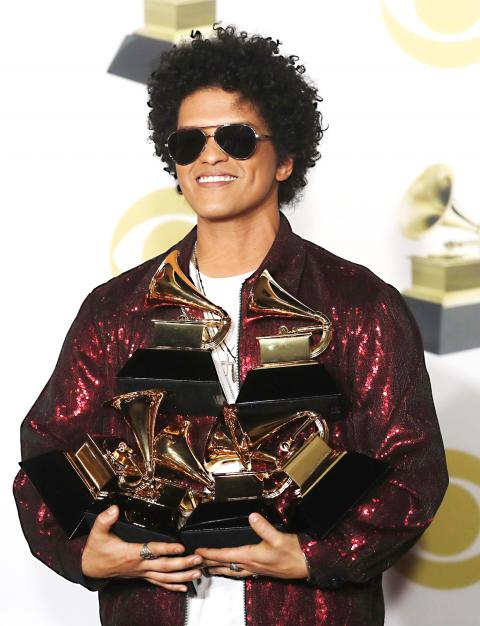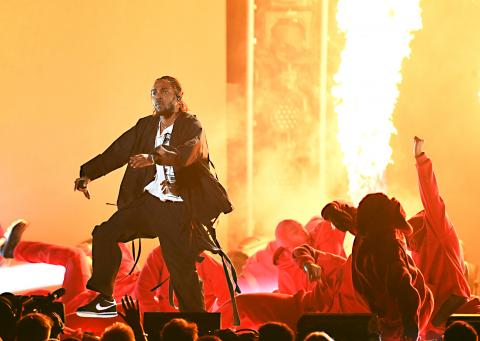The Grammy Awards seemed poised to make this a triumphant year for rap at music’s showcase event — until Bruno Mars crashed the party.
The song-and-dance man from Hawaii won all six awards he was nominated for on Sunday night, including the three most prestigious Grammys for song (That’s What I Like), record (24K Magic) and album of the year. His music also dominated the rhythm and blues categories.
The Grammys also saw Kendrick Lamar win five awards, Jay-Z go home empty-handed, some memorable performances by the likes of Lamar, Kesha, Mars and Logic, an odd oversight of singer Lorde and a surprise cameo from Hillary Clinton.

Photo: Reuters
In accepting a trophy for the album 24K Magic, Mars recalled when he was 15 years old and singing shows for tourists. He’d perform hits written by Babyface, Teddy Riley and Jimmy Jam & Terry Lewis, and loved looking down from the stage to see people from all over the world who had never met dancing together and toasting one another.
“All I ever wanted to do with this album was that,” he said. “These songs were written with nothing but joy.”
Mars has won 11 Grammys in his career.

Photo: AP
His success, however, instantly became a target for second-guessers, similar to people befuddled last year when Adele won album of the year over Beyonce. Social media filled with commentary about whether Lamar’s hard-hitting disc DAMN was more deserving. One meme that spread on Twitter showed Houston Rocket James Harden rolling his eyes in supposed “reaction” to the news.
Beyond being a critical favorite, Lamar seemed primed to be the evening’s star. He opened the Grammys with a hard-hitting medley that depicted black dancers falling to the floor to symbolize being shot, and won the night’s first televised award. His work swept the rap categories, the prime factor in the night’s most-nominated artist, Jay-Z, winning nothing.
Lamar paid tribute to Jay-Z (“Jay-Z for president,” he said with a smile) and other forebears in accepting a Grammy.

Photo: AFP
“I thought it was about the accolades and the cars and the clothes,” he said. “But it really is about expressing yourself and putting that paint on the canvas for the world to evolve for the next listener, the next generation after that. Hip-hop has done that for me.”
PLATFORM FOR CAUSES
Clinton’s appearance was the punch line for a skit where host James Corden pretended to cast celebrities for what he thought would be a sure-fire Grammy contender for spoken world performance next year, reading from Michael Wolff’s best-seller about the Trump administration, Fire and Fury. Cher, John Legend and Snoop Dogg left him frustrated, but then Clinton lowered a copy of the opened book in front of her face to reveal herself.
The attempt at humor wasn’t a hit with everyone: Donald Trump’s ambassador to the UN, Nikki Haley, tweeted that the skit ruined the show for her.
Most of the show’s political references — to topics like gun violence, immigration reform and women’s rights — were carefully scripted.
Kesha was joined by Cyndi Lauper, Camila Cabello, Julia Michaels, Andra Day and others in a performance of her Grammy-nominated song Praying, which is about fighting back from abuse. Singer Janelle Monae introduced Kesha and tied the appearance to the current flood of women speaking up about sexual misconduct. Dozens of artists and music industry players also sported white roses in support of the Time’s Up and #MeToo movements against sexual abuse and harassment.
“We come in peace but we mean business. To those who would dare try to silence us, we offer two words: Time’s Up,” Monae said. “It’s not just going on in Hollywood. It’s not just going on in Washington. It’s here in our industry, too.”
OTHER TIDBITS
The show also featured a somber performance of Eric Clapton’s Tears in Heaven by country artists Maren, Eric Church and the Osborne Brothers. All were on the bill for the Las Vegas show in October of last year that was torn apart by a mass shooter.
Social media was curious about the seeming snub of album of the year nominee Lorde. She wasn’t among the night’s performers, even as classic rockers Sting and U2 made multiple appearances.
“It’s hard to have a balanced show and have everybody involved,” producer Ken Ehrlich said backstage. “Every year’s different. We can’t have a performance from every nominee.”
The Grammys were also a clear example of rock ‘n’ roll’s decline as a creative force. No rock awards were given during the televised portion of the Grammys. Sting sang a 30-year-old hit and the majority of rock’s references were about artists who had died like Chuck Berry, Fats Domino and Tom Petty.
The Rolling Stones, once judged rock’s kingpins, won the third Grammy of their career — for best traditional blues recording.
Alessia Cara won the Grammy for best new artist, and remembered the time when she would “win” Grammys in her dreams while singing in the shower.
Chris Stapleton won three Grammys in country categories. Other multiple winners included Ed Sheeran, CeCe Winans, Justin Hurwitz and Jason Isbell.
The late Leonard Cohen won a Grammy for his performance of You Want it Darker. Actress Carrie Fisher and sound engineer Tom Coyne were other posthumous winners.
As it has in recent years, the Grammys downplayed the awards for performances by the industry’s biggest stars. Highlights included Mars and Cardi B dueting on Finesse; Rihanna, DJ Khaled and Bryson Tiller on Wild Thoughts; and Patti Lupone’s Broadway classic Don’t Cry For Me Argentina.

In the next few months tough decisions will need to be made by the Taiwan People’s Party (TPP) and their pan-blue allies in the Chinese Nationalist Party (KMT). It will reveal just how real their alliance is with actual power at stake. Party founder Ko Wen-je (柯文哲) faced these tough questions, which we explored in part one of this series, “Ko Wen-je, the KMT’s prickly ally,” (Aug. 16, page 12). Ko was open to cooperation, but on his terms. He openly fretted about being “swallowed up” by the KMT, and was keenly aware of the experience of the People’s First Party

Aug. 25 to Aug. 31 Although Mr. Lin (林) had been married to his Japanese wife for a decade, their union was never legally recognized — and even their daughter was officially deemed illegitimate. During the first half of Japanese rule in Taiwan, only marriages between Japanese men and Taiwanese women were valid, unless the Taiwanese husband formally joined a Japanese household. In 1920, Lin took his frustrations directly to the Ministry of Home Affairs: “Since Japan took possession of Taiwan, we have obeyed the government’s directives and committed ourselves to breaking old Qing-era customs. Yet ... our marriages remain unrecognized,

Not long into Mistress Dispeller, a quietly jaw-dropping new documentary from director Elizabeth Lo, the film’s eponymous character lays out her thesis for ridding marriages of troublesome extra lovers. “When someone becomes a mistress,” she says, “it’s because they feel they don’t deserve complete love. She’s the one who needs our help the most.” Wang Zhenxi, a mistress dispeller based in north-central China’s Henan province, is one of a growing number of self-styled professionals who earn a living by intervening in people’s marriages — to “dispel” them of intruders. “I was looking for a love story set in China,” says Lo,

Standing on top of a small mountain, Kim Seung-ho gazes out over an expanse of paddy fields glowing in their autumn gold, the ripening grains swaying gently in the wind. In the distance, North Korea stretches beyond the horizon. “It’s so peaceful,” says the director of the DMZ Ecology Research Institute. “Over there, it used to be an artillery range, but since they stopped firing, the nature has become so beautiful.” The land before him is the demilitarized zone, or DMZ, a strip of land that runs across the Korean peninsula, dividing North and South Korea roughly along the 38th parallel north. This